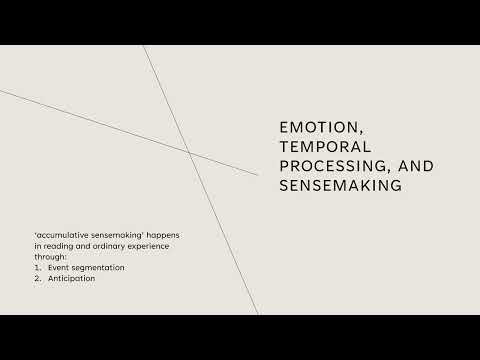 Speaker: Brook Miller @brook.miller
Speaker: Brook Miller @brook.miller
 Affiliation: University of Central Florida Center for Humanities and Digital Research
Affiliation: University of Central Florida Center for Humanities and Digital Research
Title: Narrativity and Reading Narratives
Short Abstract: This presentation considers the cognitive processing that occurs during the reading of narratives. It builds on Fludernik’s concept of ‘experientiality’ to describe the abstraction processes of both ordinary experiences and narrative reading in terms of the role the felt quality of experiences plays in information processing, rather than vice versa. This leads to a taxonomy of emergent structures in reading and ordinary experiences, including emergent qualities such as relational salience and dynamic valuation. The chapter concludes by describing the bottom-up aspects of reading narrative from these experiential building blocks.

 Long abstract
Long abstract
Humans have the remarkable capacity to have experiences while reading narratives. Even before accounting for how this works, understanding the information processing involved in reading narratives is challenging. Meretoja (2022) describes reading narratives as a “triple hermeneutic,” in which the basic interpretative processes of perception and ordinary sense making are supplemented with a third interpretive level (p. 13).
Reading narratives is a complex informational task. To read a narrative text, a reader confronts written words and forms concepts that, through the reading process, are developed and related to other concepts into a complete story, about which the skilled reader can derive summary information. The extraction and synthesis of information draws upon the reader’s repositories of social, natural, and aesthetic knowledge, and as such may be thought of as a process of translation.
Anyone who has seen a filmic adaptation of a beloved novel and has been disconcerted by the casting and acting of a key character has confronted this. When a protagonist seems not as you imagined her, the fact of your translation of words into concepts that are not precisely indicated in the text becomes clear. The making and synthesis of concepts from words involve significant cognitive processing. Given the nature of the concepts and the significance of time to their relations, the reader must coordinate discrete concepts with the whole of a narrative, as well as new concepts that emerge because of the relations of concepts that become apparent as the narrative is read. Both the working through of a reading of a text and subsequent reflection involve, then, complex cognitive work. To understand reading narratives, we must closely consider how readers translate texts into time-dependent informational/conceptual networks.
It would seem even more daunting to understand how these concepts generate experiences as they are formed and coordinated. As one prominent narrative theorist puts the matter, a fundamental feature of narratives is that they convey qualia.1 On first consideration, this would seem to make narratives a kind of super capacity. We generate and interrelate concepts by translating words, and as we generate them we have a phenomenologically rich experience of them.
This presentation presents a streamlined version of the argument from my 2023 book Narrativity in Cognition and considers several possible updates to the argument raised in reviews and recent research. The presentation argues that, while aesthetic experiences engendered by reading narratives are indeed extraordinary, the processes they are grounded in are mostly not. As several scholars have pointed out (see below), the processing model just described puts the cart before the horse: so-called qualia are not subsequent to information processing, but integral to it. This presentation contributes to this conversation by offering a set of gap-filling ideas to further develop models that foreground the phenomenology of reading narrative.
Specifically, it argues for isomorphic processes in reading and ordinary experiences. Subsequently, it offers a taxonomic description of conceptual processing in reading narrative that distinguishes between high-level processes distinctive to reading and low-level processes common to all experiences, and it describes their interrelations. This foregrounds processes necessary for understanding and experiencing narrative that are also present in some non-reading experiences. In sum, reading narrative draws upon basic capacities that generate the phenomenology of experience and builds upon them. Moreover, in light of recent research blurring traditional lines between perception and conceptualization, the phenomenology and informational features of translating language likely combine in generating the imaginary simulations produced in reading narratives.
References:
Meretoja, H. (2022). Life and narrative. The Routledge Companion to Narrative Theory, 273-285. https://doi.org/10.4324/9781003100157-26

